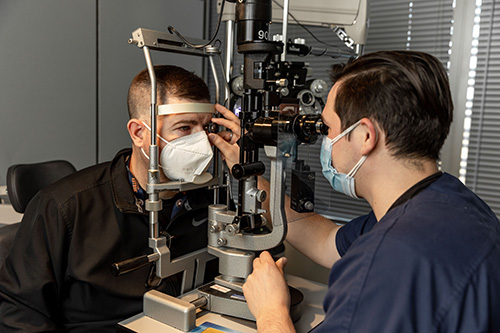Astigmatism
What is Astigmatism?
Astigmatism is a common, treatable eye condition that causes blurry vision at all distances. Astigmatism occurs when either the cornea or lens has mismatched curves. If a normal eye is shaped like a baseball, an eye with an astigmatism is shaped like an egg. That mismatched curve means that two different images will be formed that overlap or combine, causing blurred vision. Patients may also notice headaches, eyestrain, squinting, difficulty with night vision, and blurred or distorted vision. Astigmatism can be easily corrected with glasses, contacts, or surgery.
 Causes of Astigmatism
Causes of Astigmatism
Doctors don’t know the cause, but astigmatism may be present at birth or may develop after an injury, disease, or surgery. It isn't caused or worsened by squinting, reading in low light, or sitting too close to electronics. Astigmatism may occur in combination with other refractive errors, including near-sightedness and far-sightedness.
Symptoms of Astigmatism
In addition to blurred vision, patients may notice headaches, eyestrain, squinting, difficulty with night vision, and distorted vision. Sometimes, the astigmatism is minor and does not cause bothersome symptoms.
Diagnosis of Astigmatism
The diagnosis can be confirmed in a comprehensive eye exam, during which the doctor will test how your eye bends light.
Treatment of Astigmatism
When the curve is pronounced enough, a patient benefits from corrective lenses or refractive surgery. Eye glasses and contacts can compensate for the uneven shape of the eye. Certain types of rigid contacts can be worn at night to actually reshape the eye for better day vision.
Refractive surgeries that may be considered are:
LASIK Surgery
LASIK is an outpatient surgery procedure that corrects astigmatism by reshaping an irregular cornea — the clear, round dome at the front of the eye — to improve the way the eye focuses light rays onto the retina at the back of the eye. The ophthalmologist creates a thin flap in the cornea using either a blade or laser. The surgeon folds back the flap and removes corneal tissue under the flap with a laser. The flap is then laid back into its original position to heal.
LASEK Surgery
LASEK eye surgery can also reshape the cornea with an excimer laser, allowing light entering the eye to be properly focused on the retina for clearer vision. The corneal epithelium is separated from the underlying stromal layer, and the surgeon pushes the ultra-thin epithelial “flap” to the side, exposing the corneal stroma for laser reshaping.
LASEK avoids the complications that come with creating and reattaching the flap in the cornea. Patients also report fewer cases of dry eyes, as compared to LASIK. It tends to take a little longer to visually recover after LASEK.
PRK Surgery
Photorefractive keratectomy, or PRK, is a type of laser eye surgery developed before LASIK to correct mild to moderate astigmatism. A laser that delivers a cool pulsing beam of ultraviolet light is used to remove the thin outer layer of the cornea. It will naturally grow back a few days after the surgery. PRK does have a longer recovery time because the outer layer of the cornea needs to grow back to cover the eye’s surface.
Your Cizik Eye Clinic doctor will discuss the best choice for your case and the recovery details.
What you can expect at the Cizik Eye Clinic
The Cizik Eye Clinic opened in 2007 and is located at 6400 Fannin Street. It includes dozens of exam areas, multiple operating rooms, and laser suites equipped with the most sophisticated equipment available for patient care.
People travel from across the country and the world for treatment at the Cizik Eye Clinic, in part because our affiliation with the McGovern Medical School at UTHealth provides unmatched resources and expertise. Our friendly staff works diligently to make your visit pleasant and efficient, as we maximize patient flow through everything from routine eye exams to the most advanced eye surgeries.
Our physicians are faculty members at McGovern Medical School and are board certified by the American Board of Ophthalmology or are board eligible. At the Cizik Eye Clinic, we understand that the eye is a small part of a whole patient who deserves top-notch, comprehensive care in a cutting-edge facility.

 Causes of Astigmatism
Causes of Astigmatism